Could hard-right Supreme Court haunt GOP? History says maybe
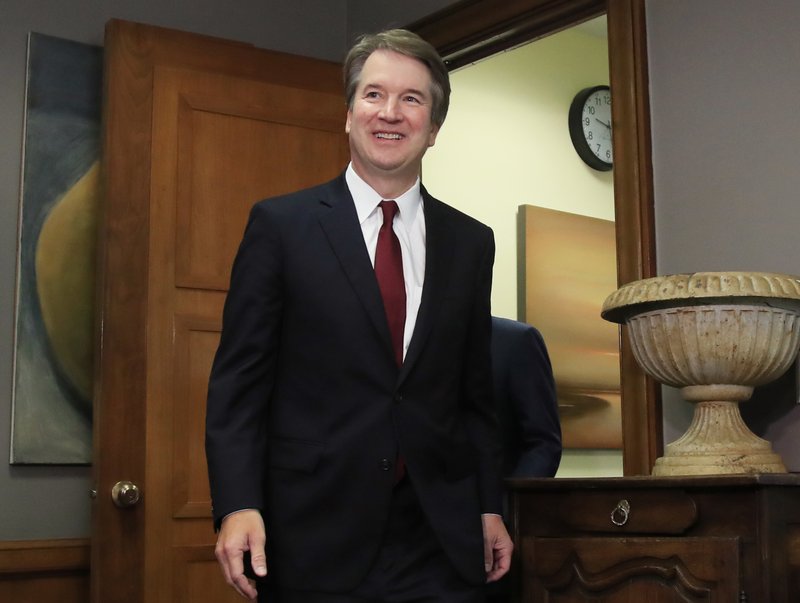
Be careful what you wish for. That’s the history lesson for Republicans eagerly anticipating Brett Kavanaugh’s ascension to the Supreme Court, which could cement conservative control of the court for a generation. The GOP may ultimately pay a political price. When and how steep? That depends on how momentous the issues and how jolting the decisions, according to legal scholars who’ve studied the high court’s impact on electoral politics. The past century is replete with cautionary tales for political parties that rejoice when the Supreme Court’s ideology turns their way. That track record, coupled with today’s intensifying partisanship, suggests that when it comes to high court nomination fights, both sides should be careful what they wish for. “In a democracy, what matters is winning votes,” said Michael Klarman, a Harvard Law School professor who has studied constitutional history. “And you shouldn’t trust the courts to win your battles for you, because there’s going to be a backlash if they go too far, too fast.” Such words of caution won’t have a discernible impact on senators, who have little incentive to abandon their own or their parties’ ideological preferences. “I’ll vote to confirm Kavanaugh and I’ll take my chances,” said No. 2 Senate GOP leader John Cornyn of Texas. But since Kavanaugh’s confirmation could tip the court decisively to the right for years, the past consequences of some such shifts are instructive. In the 1930s, a conservative Supreme Court knocked down many of President Franklin D. Roosevelt’s New Deal programs aimed at hoisting the country out of the Depression. Statutes letting industries and unions set wages and prices, raising farm income and regulating the coal industry were declared unconstitutional, as was a New York minimum wage law. That helped fuel a 1936 FDR landslide that also gave Democrats 76 Senate and 334 House seats, Election Day majorities neither party has ever matched. The triumph paved the way for congressional control that Democrats didn’t relinquish until after World War II. The Warren Court’s liberal decisions of the 1960s helped power Richard Nixon’s law-and-order rise to the White House in 1968. Rulings buttressing criminals’ rights, like the Miranda vs. Arizona decision requiring authorities to inform arrested people of their rights, provided potent ammunition for Nixon at a time of racial unrest and growing crime rates. “Some of our courts in their decisions have gone too far in weakening the peace forces as against the criminal forces in this country and we must act to restore that balance,” Nixon said in his acceptance speech 50 years ago this week at the Republican national convention in Miami Beach, Florida. The 1973 Roe v. Wade case legalizing abortion has been backed by strong majorities of Americans but spurred the rise of the anti-abortion movement and helped galvanize political involvement by Christian conservatives. Both remain vital factors in American politics and a driving force for the GOP. The disconnect between the court’s ideological leanings and voters’ preferences occurs because justices are appointed for life. With turnover on the bench infrequent, the court’s views often lag behind the election results of the presidents and senators who pick them. “Over the long course of time, the court follows broader political trends,” said Thomas Keck, a Syracuse University political scientist who studies the Supreme Court and political movements. “But it doesn’t tend to turn as quickly as the elected branches” of government. Kavanaugh’s nomination could be pivotal. He would replace the retiring Anthony Kennedy, who’s been the nine-member court’s swing vote on issues including same-sex marriage, corporate campaign contributions and gun rights. Yet Kavanaugh’s confirmation wouldn’t guarantee that the court would veer firmly rightward because forecasting justices’ long-term viewpoints is historically tricky. Chief Justice Earl Warren, a GOP California governor appointed by President Dwight Eisenhower, steered one of the most liberal courts in history. Anthony Kennedy was appointed by conservative icon President Ronald Reagan but protected abortion rights. Chief Justice John Roberts was selected by President George W. Bush but cast the decisive tally preserving Obama’s health care law. But there will inevitably be numerous opportunities for the court to address politically searing issues. In its coming term alone, the justices might face cases about special counsel Robert Mueller’s investigation of Russian intrusion in the 2016 presidential race, religious liberty and sexual orientation. Future cases could emerge over curtailing Obama’s health care statute, revoking protections against deporting young immigrants and curbing abortion rights — issues that galvanize conservative and liberal voters alike. Joseph Ura, a political scientist at Texas A&M University, says the impact of a sharp, rightward court shift could be felt quickly enough to affect a Trump re-election bid in 2020, if not sooner. In a 2014 study, Ura used computer modeling to compare five decades of important court decisions to the public mood. He concluded that there is a quick backlash against shifts in the court’s ideology that lasts about two years before eroding, followed by a slight, longer-term swing toward the justices’ viewpoints. Ura’s guidance to Democrats, should a Kavanaugh confirmation produce high-profile court decisions invalidating liberal programs? “My advice to them is to campaign on this,” he said. Republished with the permission of the Associated Press.
GOP senators rave about Brett Kavanaugh; Dems prepare to grill him
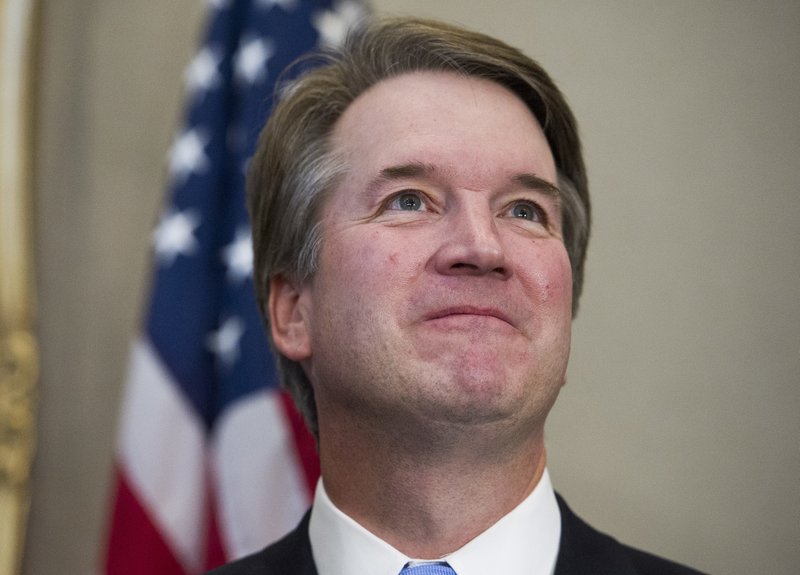
Now that Supreme Court nominee Brett Kavanaugh has met privately with almost every Republican senator, it’s becoming increasingly clear President Donald Trump’s pick for the bench is running into little GOP resistance to confirmation this fall. The conservative appellate judge is breezing past swirling questions over his views on executive power and his approach to gay marriage, abortion and other legal issues. Kavanaugh left some Republicans with the impression that his earlier reluctance to investigate sitting presidents would not impede the Russia investigation of special counsel Robert Mueller. Other senators avoided such queries, preferring more of a get-to-know-you session with the 53-year-old judge to hear his story. Ask the GOP senators what they’re learning in their private chats and they’ll tell you the following: Kavanaugh loves his family. Lives for the law. And, like the president he once worked for, George W. Bush, he’s open and chatty, the kind of guy you’d like to have a beer with. “I just wanted to understand — try to understand — what’s in his heart,” said Sen. John Kennedy, R-La., who added that he was saving his legal questions for Kavanaugh’s confirmation hearings. “He impresses me as the sort of guy that would actually talk and get to know the people who clean his office.” The practice of Supreme Court nominees making “courtesy calls” to senators seems to have begun around 1970, according to the Senate Historical Office. That year, nominee Harry Blackmun made the rounds ahead of his confirmation hearing before the Judiciary Committee. Some senators use the visits to probe the nominee’s judicial philosophy, while others treat it more like a photo op. Since being nominated July 9, Kavanaugh has met with 47 senators — all but one of them Republican — at a rapid clip. The meetings have created growing momentum for Kavanaugh among Republicans that Democrats may be hard-pressed to stop. Even one early skeptic, Sen. Rand Paul of Kentucky, is now a yes vote. Still, the most challenging meetings for Kavanaugh are yet to come. Two key Republican senators, Lisa Murkowski of Alaska and Susan Collins of Maine, remain among the holdouts. They plan to meet with the judge this month. But even those two independent-minded senators, who both support abortion rights, may be unwilling to break with their party and prevent Trump from filling a second seat on the Supreme Court. Kavanaugh is also likely to meet with Democrats in mid-August, and they are certain to press the judge on a variety of hot-button issues. Only one Democrat,Joe Manchin of West Virginia, has met with Kavanaugh so far, and a person familiar with that session said Kavanaugh stressed his independence. The Republicans who have already met with Kavanaugh are leaving the meetings increasingly confident in Trump’s choice. Sen. David Perdue of Georgia said he asked the judge what he holds important. “We talked about how the partisanship really has created this gridlock and therefore it weakens us in terms of standing up,” said Perdue, a close ally of the president. “He says, ’Well, my desire all along has been to be a very studious defender of the Constitution and try to interpret the law, not make law.” Sen. Thom Tillis of North Carolina said he was satisfied that Kavanaugh’s earlier skepticism of special counsel investigations — like Mueller’s probe — was rooted in his work on Kenneth Starr’s team investigating Bill Clinton, rather than the events of today. “I don’t see how the two can be intertwined,” Tillis said. GOP Sen. James Lankford of Oklahoma said he did not broach the topic because he is already convinced Kavanaugh’s writings are not applicable to Mueller’s probe. “I didn’t take it that we shouldn’t do investigations. At all,” Lankford said. “The fact of the matter is Judge Kavanaugh is going to sit on the United States Supreme Court when we’re through,” said Sen. Orrin Hatch, R-Utah. Late last week, Democrats lost ground in their fight to unearth some 1 million documents related to Kavanaugh’s time as staff secretary at the Bush White House, a three-year stint on his resume that Republicans say is irrelevant to his qualifications for the court. Republicans have not asked for the records, and the National Archives has told Democrats it cannot process their request without GOP support. Kristine Lucius, the executive vice president for policy at the advocacy group The Leadership Conference on Civil and Human Rights, is pushing for the full release of the Kavanaugh documents and not those being handpicked by Republicans. She objects to “the notion that we would just have a curtain within three years of his record.” Democrats now plan to take their case directly to Kavanaugh, potentially turning the “courtesy calls” into cross-examination sessions of his thoughts on Bush-era topics like the detention of terrorism suspects and signing statements on legislation. Those subjects are likely covered in the documents Republicans refuse to seek. Republicans counter that there are already plenty of ways to scrutinize Kavanaugh’s record. He has handled more than 300 cases since 2006 as an appellate judge. Already the Judiciary Committee has requested some 125,000 files from Kavanaugh’s other years in the White House counsel’s office and 20,000 from his work on the Starr investigation. And with a 51-49 GOP majority in the Senate, narrowed with the longtime absence of the ailing Sen. John McCain, R-Ariz., Republicans will be able to confirm Kavanaugh if they hold together and prevent defections. GOP Sen. Deb Fischer of Nebraska said she was preparing a floor speech to deliver after her meeting with Kavanaugh, whom she found to be an incredibly open, honest man. “I don’t know how anyone could oppose him,” she said. “I really don’t.” Republished with the permission of the Associated Press.
Donald Trump calls on Jeff Sessions to end Robert Mueller’s Russia probe
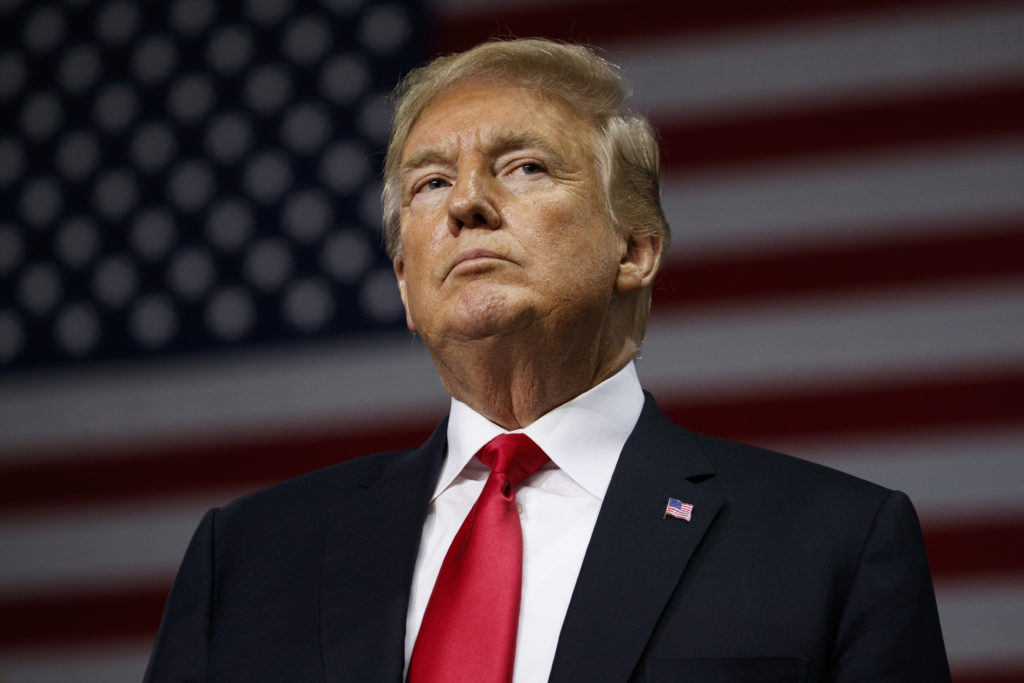
President Donald Trump called Wednesday for Attorney General Jeff Sessions to put an end to special counsel Robert Mueller‘s Russia probe, a day after Trump’s former campaign chairman went on trial. Taking to Twitter to complain about the ongoing Russia investigation, Trump said Sessions “should stop this Rigged Witch Hunt right now, before it continues to stain our country any further.” The relationship between Sessions and the president has been strained for more than a year, since the attorney general recused himself from investigations relating to the 2016 election because of Sessions’ role on the Trump campaign. Mueller’s team is accountable to Deputy Attorney General Rod Rosenstein. Tuesday marked the first day of Paul Manafort‘s trial on charges of tax evasion and bank fraud brought by Mueller’s team, charges that stemmed from Manafort’s consulting work for Ukraine, for which he allegedly received millions he did not report to the U.S. government. Seeking to distance himself from his ex-campaign chairman, Trump said, “He worked for me for a very short time.” But Manafort’s involvement in the Trump campaign spanned six months, and he led efforts to secure the GOP nomination for Trump in 2016. Trump said the charges against Manafort “have nothing to do with Collusion.” Potential coordination between Russian government agents and the Trump campaign is still a matter of investigation by Mueller’s team, which is also investigating potential obstruction of justice by the president. Trump called claims of collusion “a Hoax.” Republished with permission from the Associated Press.
12 Russians accused of hacking Democrats in 2016 U.S. election
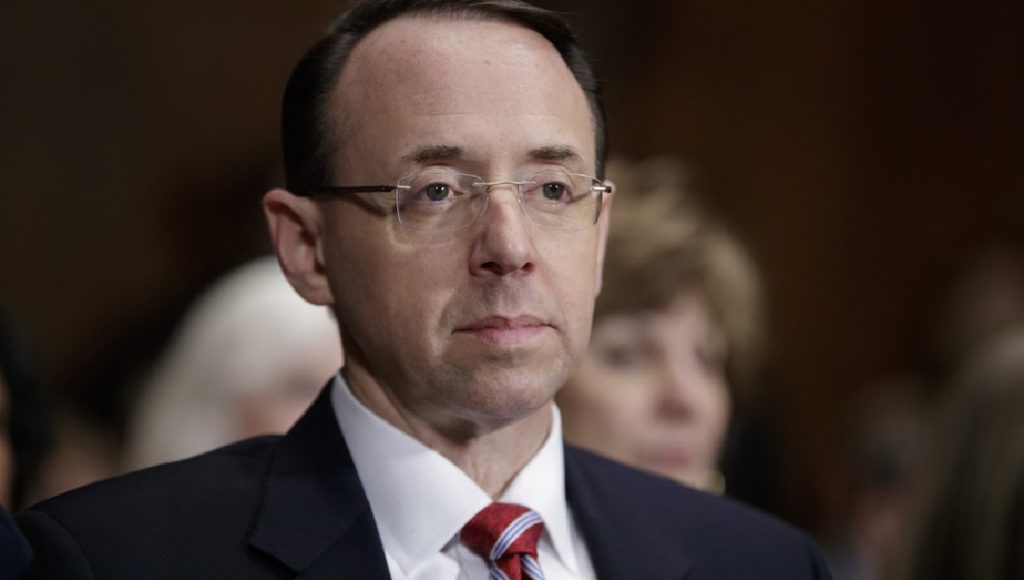
Twelve Russian intelligence officers were indicted on charges they hacked into Democratic email accounts during the 2016 U.S. presidential election and released stolen information in the months before Americans headed to the polls, the Justice Department said Friday. The indictment — which comes days before President Donald Trump holds a summit with Russian President Vladimir Putin — was the clearest allegation yet of Russian efforts to meddle in American politics. U.S. intelligence agencies have said the interference was aimed at helping the presidential campaign of Republican Donald Trump and harming the election bid of his Democratic opponent, Hillary Clinton. The indictment lays out a sweeping and coordinated effort to break into key Democratic email accounts, including those belonging to the Democratic National Committee, the Clinton campaign and the Democratic Congressional Campaign Committee. The charges come as special counsel Robert Mueller investigates potential coordination between Russia and the Trump campaign to influence the presidential election. The indictment does not allege that Trump campaign associates were involved in the hacking efforts or that any American was knowingly in contact with Russian intelligence officers. The indictment also does not allege that any vote tallies were altered by hacking. Still, Deputy Attorney General Rod Rosenstein said the internet “allows foreign adversaries to attack Americans in new and unexpected ways. Free and fair elections are hard-fought and contentious and there will always be adversaries who work to exacerbate domestic differences and try to confuse, divide and conquer us.” Before Friday, 20 people and three companies had been charged in the Mueller investigation. That includes four former Trump campaign and White House aides, three of whom have pleaded guilty to different crimes and agreed to cooperate, as well as 13 Russians accused of participating in a hidden but powerful social media campaign to sway American public opinion in the 2016 election. Hours before the Justice Department announcement, Trump complained anew that the special counsel’s investigation is complicating his efforts to forge a better working relationship with Russia. Trump and Putin are to hold talks Monday in Finland, a meeting largely sought by Trump. Trump said at a news conference Friday near London with British Prime Minister Theresa May that he wasn’t going into the meeting with Putin with “high expectations.” “We do have a — a political problem where — you know in the United States we have this stupidity going on. Pure stupidity,” he said, referring to Mueller’s probe. “But it makes it very hard to do something with Russia. Anything you do, it’s always going to be, ‘Oh, Russia, he loves Russia.’” “I love the United States,” Trump continued. “But I love getting along with Russia and China and other countries.” Republished with the permission of the Associated Press.
Donald Trump picks Brett Kavanaugh for court, setting up fight with Democrats

President Donald Trump chose Brett Kavanaugh, a solidly conservative, politically connected judge, for the Supreme Court Monday night, setting up a ferocious confirmation battle with Democrats as he seeks to shift the nation’s highest court ever further to the right. A favorite of the Republican legal establishment in Washington, Kavanaugh, 53, is a former law clerk for retiring Justice Anthony Kennedy. Like Trump’s first nominee last year, Justice Neil Gorsuch, Kavanaugh would be a young addition who could help remake the court for decades to come with rulings that could restrict abortion, expand gun rights and roll back key parts of Obamacare. “He is a brilliant jurist, with a clear and effective writing style, universally regarded as one of the finest and sharpest legal minds of our time,” Trump said in his prime-time televised White House announcement. He added: “There is no one in America more qualified for this position, and no one more deserving.” With Kavanaugh, Trump is replacing a swing vote on the nine-member court with a staunch conservative. Kavanaugh, who serves on the Court of Appeals for the D.C. Circuit, is expected to be less receptive to abortion and gay rights than Kennedy was. He also has taken an expansive view of executive power and has favored limits on investigating the president. Speaking at the White House, Kavanaugh pledged to preserve the Constitution and said that “a judge must be independent and must interpret the law, not make the law. A judge must interpret the Constitution as written.” A senior White House official said Trump made his final decision on the nomination Sunday evening, then phoned Kavanaugh to inform him. The official said Trump decided on Kavanaugh because of his large body of jurisprudence cited by other courts, describing him as a judge that other judges read. On Monday, Trump phoned retiring Justice Kennedy to inform him that his former law clerk would be nominated to fill his seat. Trump signed Kavanaugh’s nomination papers Monday evening in the White House residence. Top contenders had included federal appeals judges Raymond Kethledge, Amy Coney Barrett and Thomas Hardiman. Some conservatives have expressed concerns about Kavanaugh, questioning his commitment to social issues like abortion and noting his time serving under President George W. Bush as evidence he is a more establishment choice. But his supporters have cited his experience and wide range of legal opinions. With Democrats determined to vigorously oppose Trump’s choice, the Senate confirmation battle is expected to dominate the months leading up to November’s midterm elections. Senate Republicans hold only a 51-49 majority, leaving them hardly any margin if Democrats hold the line. Democratic senators running for re-election in states Trump carried in 2016 will face pressure to back his nominee. Senate Majority Leader Mitch McConnell called Kavanaugh “a superb choice” and said senators would start meeting with him this week. Some Republican senators had favored other options. Rand Paul of Kentucky had expressed concerns but tweeted that he looked forward to meeting with Kavanaugh “with an open mind.” Democrats and liberal advocacy groups quickly lined up in opposition. Signaling the fight ahead on abortion rights, Dawn Laguens, executive vice president of Planned Parenthood Federation of America, said in a statement: “There’s no way to sugarcoat it: With this nomination, the constitutional right to access safe, legal abortion in this country is on the line. The White House invited a number of senators to attend the Monday night announcement. Democrats who were invited but declined included Sens. Joe Donnelly of Indiana, Heidi Heitkamp of North Dakota, Doug Jones of Alabama, Joe Manchin of West Virginia and Dianne Feinstein of California. Feinstein is the ranking Democrat on the Judiciary Committee. The others are Republican targets for the confirmation vote who come from Trump-won states where they face re-election this fall. Democrats have turned their attention to pressuring two Republicans, Sens. Susan Collins of Maine and Lisa Murkowski of Alaska, to oppose any nominee who threatens Roe v. Wade. The two have supported access to abortion services. Kavanaugh is likely to be more conservative than Justice Kennedy on a range of social issues. At the top of that list is abortion. A more conservative majority could be more willing to uphold state restrictions on abortion, if not overturn the 45-year-old landmark Roe v. Wade decision that established a woman’s constitutional right. Kennedy’s replacement also could be more willing to allow states to carry out executions and could support undoing earlier court holdings in the areas of racial discrimination in housing and the workplace. Kennedy provided a decisive vote in 2015 on an important fair housing case. Like the other eight justices on the court, Kavanaugh has an Ivy League law degree, spending his undergraduate and law school years at Yale. Since 2006, he has been a judge on the federal appeals court in Washington. He also was a key aide to Kenneth Starr during Starr’s investigation of President Bill Clinton, worked on behalf of George W. Bush’s campaign during the election recount in 2000 and served in the Bush White House. Kavanaugh’s many written opinions provide insight into his thinking and also will be fodder for Senate Democrats who will seek to block his confirmation. He has written roughly 300 opinions as a judge, authored several law journal articles, regularly taught law school classes and spoken frequently in public. Kavanaugh’s views on presidential power and abortion are expected to draw particular attention in his confirmation hearing. Drawing on his experience working on the Clinton investigation and then in the Bush White House, he wrote in a 2009 law review article that he favored exempting presidents from facing both civil suits and criminal investigations, including indictment, while in office. That view has particular relevance as special counsel Robert Mueller is looking into Russian meddling in the 2016 election and whether the Trump campaign played any role in a foreign interference plot. On abortion, Kavanaugh voted in October to delay an abortion for a teenage immigrant who was in government
DOJ lifts secrecy on foreign lobbying opinions
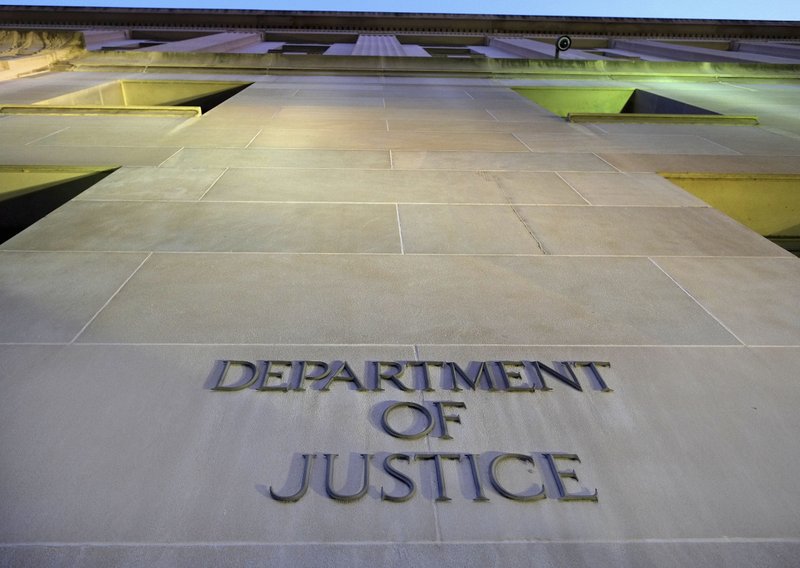
The Justice Department is opening up about the advice it has given to lobbyists who work for foreign governments and political interests. For the first time, the public will be able to read advisory opinions the department has issued to lobbyists, public relations professionals and others about whether they need to register under the Foreign Agents Registration Act, or FARA. The department had kept the opinions secret for decades, a point of contention for transparency advocates and lawyers who specialize in advising clients on complying with the law. The opinions provide an unprecedented view into the thinking of a specialized Justice Department unit whose influence has grown in recent years, propelled by more aggressive enforcement and a special counsel investigation focused on foreign influence operations inside the U.S. The Associated Press obtained copies of dozens of opinions, which were to be posted online later Friday. Those who have requested the department’s guidance include a television host who worked for a company with foreign connections, people negotiating with other governments over the release of prisoners and a firm that planned a U.S. fundraiser for a politician in another country. The department removed the names and other identifying details from the opinions to allow for their public release. In disclosing the opinions, Justice Department officials say they want the public to better understand how they interpret a decades-old law meant to allow Americans to know when foreign entities are trying to influence public opinion or policymakers. The law, enacted in 1938 to unmask Nazi propaganda in the United States, requires people to disclose to the Justice Department when they advocate, lobby or perform public relations work in the U.S. on behalf of a foreign government or political entity. “Today is the law’s 80th anniversary, and it remains a vital tool to combat this threat,” Assistant Attorney General John Demers, the department’s top national security official, said in a statement. “To enhance compliance, we are making these advisory opinions available publicly and online for the first time. By posting these advisory opinions, the Department of Justice is making clearer how we interpret some of FARA’s key provisions.” The heightened enforcement and some high-profile registrations have coincided with special counsel Robert Mueller’s Russia investigation. In the last two years alone, President Donald Trump’s former campaign chairman, Paul Manafort, and former White House national security adviser Michael Flynn have had to register under the law, as has Tony Podesta, a top Democratic lobbyist and brother of Hillary Clinton’s campaign chairman. Manafort is set to go to trial later this year on charges that he concealed his lobbying and influence work on behalf of Ukrainian interests, including a pro-Russian political party. The Justice Department also required the U.S.-based operations of RT, an international television network funded by the Russian government, to register as a foreign agent, a move that angered Russian leaders late last year. U.S. intelligence agencies have alleged RT functioned as a propaganda outlet for the Kremlin as part of an effort to interfere in the 2016 U.S. presidential election. The opinions obtained by the AP show the wide array of requests the Justice Department receives from people and companies trying to determine if they’re obligated to register. In August 2015, for instance, the department determined that a U.S. firm would have to register as a foreign agent if it wanted to host a fundraiser for a candidate running for president in another country. Last February, though, lawyers told a consultant for a foreign government that registration was unnecessary because the work was being done almost entirely outside the United States. That same month, a U.S. organization coordinating with foreign governments in the release of prisoners abroad was told it wouldn’t need to register because the work was humanitarian in nature and not funded by foreign money. Republished with the permission of the Associated Press.
Donald Trump tweet takes aim at Jeff Sessions, again
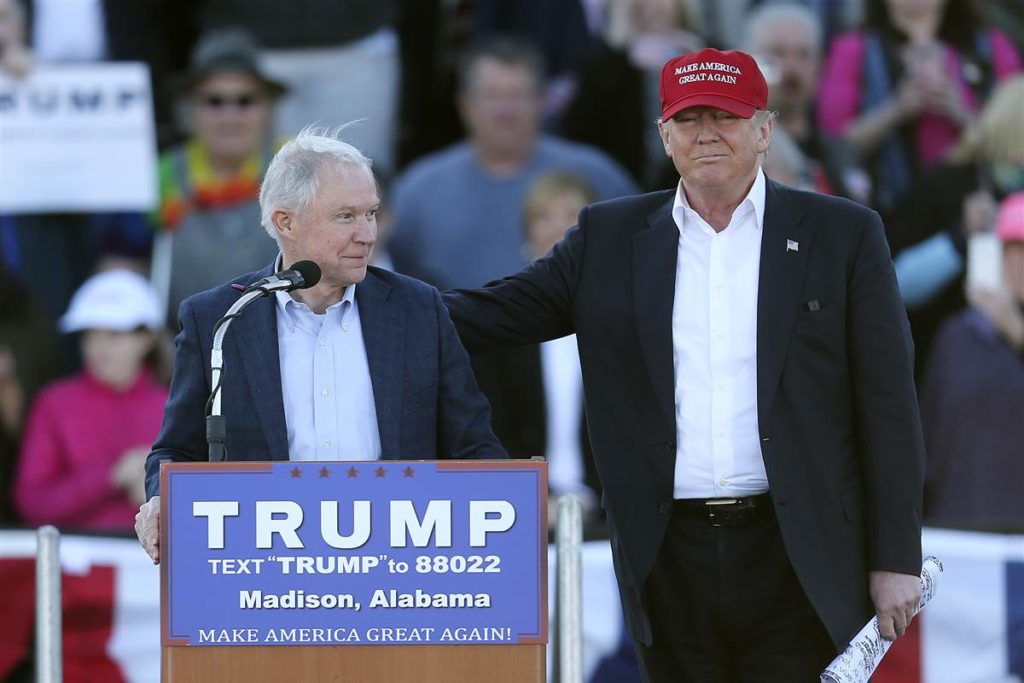
The Latest on President Donald Trump and the probe into Russian interference in the 2016 election (all times local): 7:35 a.m. President Donald Trump is blaming his attorney general, Jeff Sessions, for allowing the Russia investigation to continue. Trump tweets that he would have “picked someone else” for the top job at the Justice Department had he known Sessions would recuse himself from the probe. It’s the latest salvo from Trump in his bid to discredit the ongoing probe by special counsel Robert Mueller. Mueller is investigating Russia’s attempts to sway voters in the 2016 election and whether Trump associates provided any help. He’s also investigating whether Trump obstructed justice by taking steps to shut down the probe Trump tweeted Tuesday: “The Russian Witch Hunt Hoax continues, all because Jeff Sessions didn’t tell me he was going to recuse himself…I would have quickly picked someone else. So much time and money wasted, so many lives ruined…and Sessions knew better than most that there was No Collusion!” The Russian Witch Hunt Hoax continues, all because Jeff Sessions didn’t tell me he was going to recuse himself…I would have quickly picked someone else. So much time and money wasted, so many lives ruined…and Sessions knew better than most that there was No Collusion! — Donald J. Trump (@realDonaldTrump) June 5, 2018 ___ 7 a.m. President Donald Trump says he wants to know “what is taking so long” with an internal Justice Department probe expected to criticize the FBI and its handling of the case involving Democrat Hillary Clinton’s private email server. Trump tweets that he hopes any findings aren’t being watered down because “there are so many horrible things to tell.” The upcoming report from the Justice Department’s internal watchdog is expected to criticize senior FBI leaders for not moving quickly enough to review a trove of Clinton emails discovered late in the 2016 campaign. Trump tweeted: “What is taking so long with the Inspector General’s Report on Crooked Hillary and Slippery James Comey. Numerous delays. Hope Report is not being changed and made weaker! There are so many horrible things to tell, the public has the right to know. Transparency!” What is taking so long with the Inspector General’s Report on Crooked Hillary and Slippery James Comey. Numerous delays. Hope Report is not being changed and made weaker! There are so many horrible things to tell, the public has the right to know. Transparency! — Donald J. Trump (@realDonaldTrump) June 5, 2018 Trump has repeatedly criticized the FBI’s handling of the Russia probe and said the focus should be on the Clinton email case. __ 12:41 a.m. The former chairman of President Donald Trump’s presidential campaign is facing accusations of trying to tamper with witnesses in his ongoing criminal cases. Paul Manafort has been accused in an indictment of acting as an unregistered foreign agent by lobbying in the U.S. on behalf of Ukrainian interests. Prosecutors working for special counsel Robert Mueller allege in a court filing Monday that Manafort and one of his associates “repeatedly” contacted two witnesses in an effort to influence their testimony. Prosecutors say the contacts occurred earlier this year while Manafort was confined to his home. In the filing, the government asks a federal judge to consider jailing Manafort while he awaits trial. A spokesman for Manafort says his client and his lawyers are reviewing the filing. Republished with the permission of the Associated Press.
Saving Jeff Sessions: Inside the GOP effort to protect the Attorney General
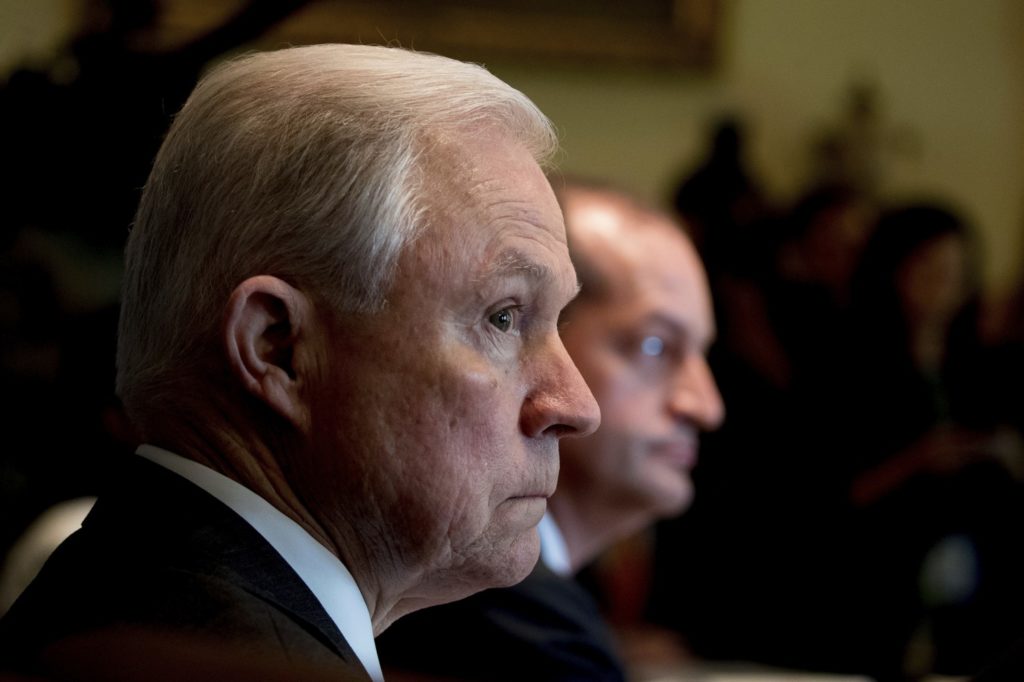
Days after President Donald Trump deemed Jeff Sessions “beleaguered” and threatened to fire him last July, members of the president’s inner circle made a desperate case to save the attorney general’s job. The White House chief of staff, Reince Priebus, and the president’s chief strategist, Steve Bannon, pleaded with Trump during a heated Oval Office meeting to keep Sessions, warning that his dismissal would only pour gasoline on the Russia investigation. And, they said, it could alienate those in Trump’s conservative base, supporters enamored with the attorney general’s tough stances on law enforcement and immigration. Priebus and Bannon both were out of their jobs within the month. But Sessions survived, his reprieve delivered by John Kelly as one of his first acts as chief of staff. Ten months later, the Republican campaign to save Sessions has continued and — at least for now — succeeded. In private meetings, public appearances on television and late-night phone calls, Trump’s advisers and allies have done all they can to persuade the president not to fire a Cabinet official he dismisses as disloyal. The effort is one of the few effective Republican attempts to install guardrails around a president who delights in defying advice and breaking the rules. It’s an ongoing effort, though not everyone is convinced the relationship is sustainable for the long term. As recently as this month, Trump lawyer Rudy Giuliani said the president had raised the issue again, wondering aloud if he’d made a mistake in not firing Sessions. And both Giuliani and influential Republican lawmakers have hinted that, once special counsel Robert Mueller’s probe wraps up, Sessions could be in danger again. “There’s no doubt he’s complained about him, there’s no doubt he has some grievances. I don’t know they’ve aired them out yet. He’s not going to fire him before this is over,” Giuliani told reporters Wednesday. “Nor do I think he should.” Trump showed Wednesday the campaign to save Sessions hasn’t tempered his anger at the attorney general’s decision to recuse himself from the Russia probe, an act the president believed birthed the Mueller investigation, which is imperiling his presidency. In a tweet, Trump again declared he regretted appointing the former Alabama senator to the job in a familiar, but no less stunning, public rebuke of a sitting Cabinet official. Despite the withering complaints, Trump appears to comprehend the potential consequences of firing Sessions and seems resigned to the idea that he’s stuck with him for the time being, according to nearly a dozen people close to the decision, who spoke on condition of anonymity to discuss private conversations. The case that Sessions’ protectors have outlined to Trump time and again largely consists of three components: Firing Sessions, a witness in Mueller’s investigation of obstruction of justice, would add legal peril to his standing in the Russia probe; doing so would anger the president’s political base, which Trump cares deeply about, especially with midterm election looming this fall; and a number of Republican senators would rebel against the treatment of a longtime colleague who was following Justice Department guidelines in his recusal. Senate Judiciary Committee Chairman Chuck Grassley, R-Iowa, has said that he will not schedule a confirmation hearing for another attorney general nominee if Sessions is fired. Giuliani told The Associated Press on Wednesday that Trump has asked him multiple times, before and after the former New York mayor joined the president’s legal team last month, about whether Sessions should have been fired. Giuliani said Trump consulted him last summer during the height of his rage about Sessions’ recusal. More recently, he said, Trump has not actively considered firing Sessions but has wondered if he made the right decision in not doing so previously. “And when he asks, ‘Should I have done that?’ I say, ’No, the way it is now has worked out,’” Giuliani said, adding that he did not believe Trump would fire Sessions. Later, speaking to reporters at the White House, he compared the president’s temper to that of the late George Steinbrenner, the mercurial owner of the New York Yankees. Influential conservatives have also heard Trump lash out about Sessions and, though some have sympathy for the concerns, have repeatedly talked him out of doing anything drastic, said one person in touch with both men who spoke on condition of anonymity to discuss private conversations. The person recalled a venting session after a meeting at the White House last fall, when the president aired his frustrations with the attorney general about his recusal. The person expressed sympathy but argued against firing Sessions, in part because of his success in carrying out the president’s agenda. Trump’s complaints about Sessions have at times won sympathy from some friends who believe Sessions’ recusal was too broad and ill-timed and undercut the positive attention from a State of the Union address the president had recently delivered. While the recusal remains Sessions’ original sin in Trump’s eyes, the president has also fumed that he sees Sessions as failing to get a handle on immigration and not placing enough emphasis on combating transnational criminal organizations. After being berated by Trump over the recusal decision last spring, Sessions offered his resignation, but the overture was rejected. He is widely viewed as determined to stay in the job because he believes in the president’s agenda, which largely mirrors his own interests, and is reluctant to leave a job for which he gave up a Senate seat. Hours after the president’s attack on Wednesday, Sessions visited the White House for a routine litigation issue, a Justice Department official said. There may be a limit to how long the campaign to save Sessions can hold on. Giuliani on Wednesday only offered assurances Trump would not fire Sessions during the Mueller investigation, because of the “distraction” it would cause. And a number of Republican senators who have supported Sessions have indicated in recent days that they are warming to Trump’s complaints. Sen. Lindsey Graham of South Carolina, who in March said firing
Donald Trump says he wishes he’d picked a different Attorney General
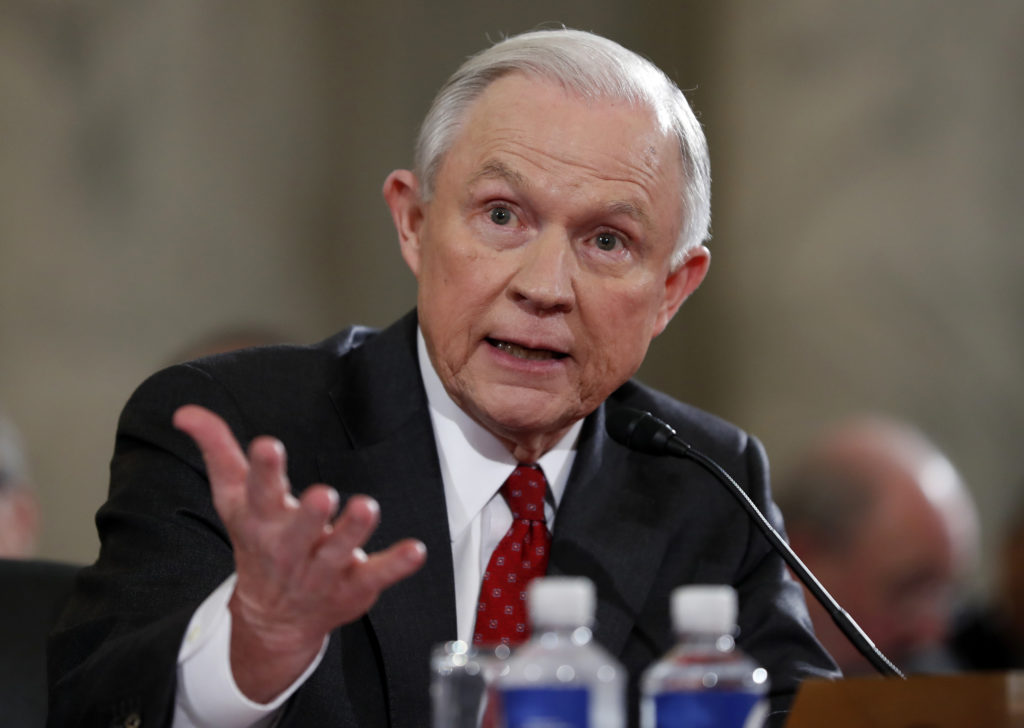
The Latest on the special counsel’s investigation into ties between the Trump campaign and Russia (all times local): 9:25 a.m. President Donald Trump, still nursing resentment against Attorney General Jeff Sessions for recusing himself from the Russia investigation, says he wishes he’d picked a different leader of the Justice Department. Trump on Wednesday tweeted a quote from Republican congressman Trey Gowdy, who said Sessions should have told Trump before accepting the job that he planned to recuse himself from the investigation. It comes amid fresh news reports that Trump had asked Sessions to rescind his recusal. Sessions recused himself for possible conflict of interest, leading to the appointment of special counsel Robert Mueller. Gowdy told “CBS This Morning” on Wednesday that “there are lots of really good lawyers in the country. He could have picked somebody else.” Trump added at the end of his tweet: “And I wish I did!” 9 a.m. A senior House Republican briefed by the FBI on its Russia probe is disputing President Donald Trump’s allegation that the agency spied on his 2016 campaign for political purposes. Rep. Trey Gowdy told “CBS This Morning” and Fox News there is no evidence of FBI misconduct or that the agency planted a “spy” in Trump’s campaign. His statements appeared to contradict the president, who has said the FBI planted a “spy for political reasons and to help Crooked Hillary win.” Gowdy told Fox on Tuesday that after receiving classified briefing on the subject “I am even more convinced that the FBI did exactly what my fellow citizens would want them to do” in acting on information. Lawmakers demanded the briefing following reports that a government informant approached Trump campaign officials. Republished with the permission of the Associated Press.
Donald Trump says illegal crossings down; they’re up
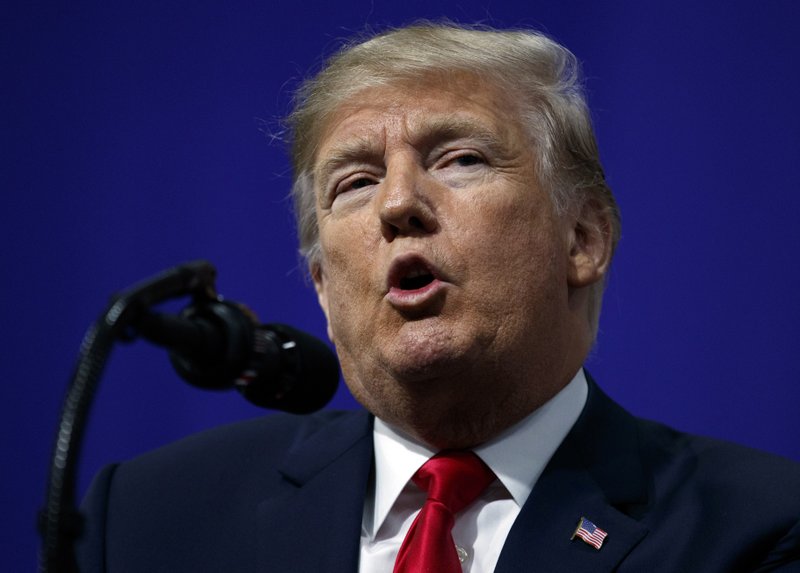
Illegal border crossings, as President Donald Trump measures them, have gone up since he took office, even as he speaks to audiences about a drop of more than 40 percent. That disconnect was among several that stood out over the past week as he opened up on the Russia investigation via Twitter, forsaking accuracy in the process, and made the false claim that he’s delivering the first big military pay increase in a decade. A look at some of his statements: TRUMP: “We’ve done a lot of work on the wall. We’re doing a lot of work on security, generally speaking, security and border — border security. The border’s down over 40 percent, and don’t forget, we have a great economy, probably the best economy the country’s ever had. So people come across, but we’re going to get the rest.” — interview broadcast Thursday with “Fox & Friends.” TRUMP: “We’re down on immigration crossing the border — more than 40 percent.” — forum Wednesday in Bethpage, New York. THE FACTS: Illegal crossings actually are up 20 percent since he became president, according to the yardstick he uses to measure them — the number of Border Patrol arrests. There is no precise measure of illegal crossings because some people don’t get caught. The Trump administration uses arrests as the best gauge of whether crossings are going up or down. The Obama administration did likewise. Border Patrol arrests did fall last year to the lowest level since 1971. But since April of last year, arrests have climbed steadily. One factor in that increase may be that people are now taking their chances to cross into the U.S. illegally after an initial wait-and-see attitude about Trump’s tough-talking approach to people sneaking into the country. Last month, there were more than 50,000 overall border arrests, which are made up of people who are stopped at land crossings and other official points of entry, according to federal data. That was more than triple the number from April 2017, which was the lowest tally on record since the Homeland Security Department was created in 2003. Overall, border arrests have increased 20 percent since January 2017, from 42,463 in January 2017 to 50,924 in April. ___ TRUMP, to U.S. Naval Academy graduates: “Going to have new equipment and well-deserved pay raises. We just got you a big pay raise. First time in 10 years. We got you a big pay increase. First time in over 10 years. I fought for you. That was the hardest one to get, but you never had a chance of losing.” — speech Friday. THE FACTS: That’s not right. U.S. military members have gotten a pay raise every year for the past 10 years and several have been larger than this year’s 2.6 percent increase. Pay increases in 2008, 2009 and 2010, for example, were all 3.4 percent or more. ___ TRUMP: “We have now the lowest number of ships that we’ve had since World War I, and very soon you’re going to get to 355 beautiful ships. 355. That’s almost a couple of hundred more ships.” — speech to academy graduates Friday. THE FACTS: No it isn’t. The Navy now has 283 ships. ___ TRUMP on former CIA Director John Brennan: “Brennan started this entire debacle about President Trump. We now know that Brennan had detailed knowledge of the (phony) Dossier…he knows about the Dossier, he denies knowledge of the Dossier, he briefs the Gang of 8 on the Hill about the Dossier, which…….they then used to start an investigation about Trump…” — tweets Monday. THE FACTS: Trump quotes conservative commentator Dan Bongino to falsely claim the Russia probe is based on a “phony dossier.” In fact, the FBI’s investigation began months before it received a dossier of anti-Trump research financed by the Democratic Party and Hillary Clinton’s campaign. The FBI probe’s origins were based on other evidence — not the existence of the dossier. The Republican-controlled House intelligence committee found the Russia probe was initiated after the FBI received information related to Trump campaign foreign policy adviser George Papadopoulos, not the dossier. The committee’s final report released in March was praised by Trump, who pointed to it as evidence that the investigation was nothing but a “witch hunt.” ___ TRUMP, on President Barack Obama’s national intelligence director, James Clapper: “Clapper has now admitted that there was Spying in my campaign. Large dollars were paid to the Spy, far beyond normal. Starting to look like one of the biggest political scandals in U.S. history. SPYGATE – a terrible thing!” — tweet Thursday THE FACTS: That’s a distortion of Clapper’s statements on ABC’s “The View” on Tuesday when he was asked about recent reports that an FBI informant spoke with several members of the Trump campaign. “They were spying on — a term I don’t particularly like but — what the Russians were doing,” Clapper said. “Trying to understand, were the Russians infiltrating? Trying to gain access, trying to gain leverage and influence? Which is what they do.” He did not say a spy was implanted “in” the campaign and he denied the FBI was spying “on” the campaign. The effort was focused on Russians, he said, was meant to “protect the campaign” and the U.S. political system. Special counsel Robert Mueller’s investigation is looking into Russian interference in the election, any collusion between Russia and the Trump campaign, possible obstruction of justice and whatever associated criminal activity might be uncovered. The probe has produced several criminal convictions of Trump campaign officials. Those charges do not implicate the president directly. Republished with the permission of the Associated Press.
Donald Trump to DOJ: Investigate whether FBI infiltrated campaign
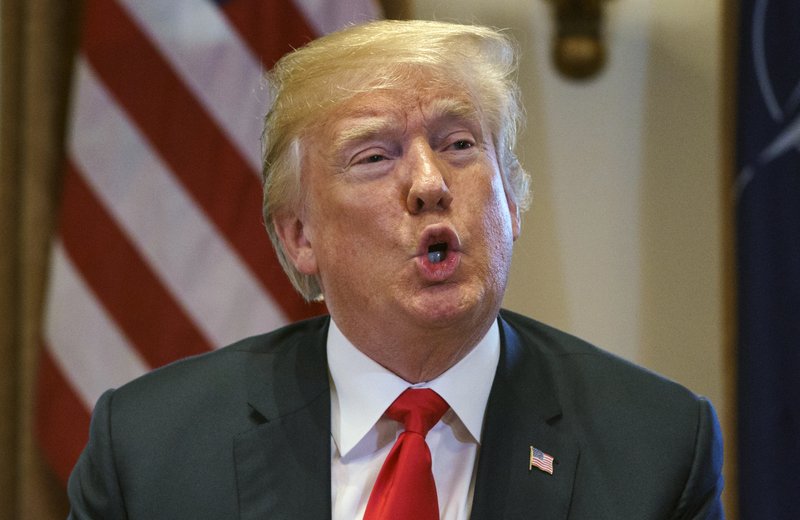
President Donald Trump said he will “demand” that the Justice Department investigate whether the FBI infiltrated his presidential campaign, an extraordinary order that came hours before his legal team said the special counsel indicated the investigation into the president could be concluded by September. Trump tweeted Sunday: “I hereby demand, and will do so officially tomorrow, that the Department of Justice look into whether or not the FBI/DOJ infiltrated or surveilled the Trump Campaign for Political Purposes – and if any such demands or requests were made by people within the Obama Administration!” Trump’s demand puts further pressure on the Justice Department, which later Sunday asked its inspector general to expand an existing investigation into the Russia probe by examining whether there was any improper politically motivated surveillance. It comes as the White House tries to combat the threat posed by special counsel Robert Mueller’s investigation into potential ties between Russia and the Trump campaign. The president’s lawyer, Rudy Giuliani, said Mueller recently shared a timetable that suggested his probe could end by Sept. 1 if Trump were to sit for an interview in July, which is the legal team’s new working plan. “We said to them, ‘If we’re going to be interviewed in July, how much time until the report gets issued?’” Giuliani told The Associated Press on Sunday, referring to the report Mueller is expected to issue to Congress at the conclusion of his investigation. “They said September, which is good for everyone, because no one wants this to drag into the midterms.” Giuliani said he did not want a repeat of what happened in 2016, when FBI Director James Comey announced in the campaign’s final days that he was reopening the investigation into Hillary Clinton’s use of a private email server, a decision Democrats believe cost Clinton the race. Giuliani, the former mayor of New York, also said Mueller’s team indicated that the entire probe could end by September, not just its investigation into potential obstruction of justice. “This would be the culmination of the investigation into the president,” Giuliani said. The special counsel’s office did not respond to a request for comment. It is not certain that Trump will sit for an interview with Mueller, though the president has publicly said he would. Giuliani said a decision would not be made until after Trump’s summit with North Korean leader Kim Jong Un in Singapore, which is slated for June 12. Giuliani said Sunday the two sides “were getting closer” to agreeing on the parameters on a potential interview but would not put the odds of it happening at better than 50/50. Giuliani’s apparent attempt to publicly pressure Mueller on the timeline amid interview negotiations came just hours after Trump’s demand for a new inquiry, which moved beyond his usual blustery accusations of institutional wrongdoing and into the realm of applying presidential pressure on the Justice Department, a move few of his predecessors have made. Trump made the order amid days of public venting about the special counsel investigation, which he has deemed a “witch hunt” that he says has yielded no evidence of collusion between his campaign and Russia. In response, the Justice Department moved Sunday to defuse a growing confrontation with the White House by asking its watchdog to investigate whether there was inappropriate surveillance. It was not immediately clear if that move would satisfy Trump, or if any further demands could lead to a confrontation with FBI Director Christopher Wray or Deputy Attorney General Rod Rosenstein, who is overseeing the Mueller investigation. Rosenstein released a statement Sunday saying, “If anyone did infiltrate or surveil participants in a presidential campaign for inappropriate purposes, we need to know about it and take appropriate action.” The Justice Department probe had begun in March at the request of Attorney General Jeff Sessions and congressional Republicans. Sessions and the lawmakers had urged Inspector General Michael Horowitz to review whether FBI and Justice Department officials abused their surveillance powers by using information compiled by Christopher Steele, a former British spy, and paid for by Democrats to justify monitoring Carter Page, a former campaign adviser to Trump. Horowitz said his office will look at those claims as well as communications between Steele and DOJ and FBI officials. Trump did not elaborate on the promised “demand,” which he included in one of a series of tweets he sent throughout the day Sunday. On Saturday, Trump tweeted, “If the FBI or DOJ was infiltrating a campaign for the benefit of another campaign, that is a really big deal.” He said only the release or review of documents the House Intelligence Committee is seeking from the Justice Department “can give conclusive answers.” Rep. Adam Schiff of California, the senior Democrat on the House Intelligence Committee, called Trump’s claim of an embedded spy “nonsense.” “His ‘demand’ DOJ investigate something they know to be untrue is an abuse of power, and an effort to distract from his growing legal problems,” Schiff tweeted. “Never mind that DOJ has warned that lives and alliances are at risk. He doesn’t care.” Trump’s extraordinary demand of the Justice Department alarmed many observers, who felt it not only violated presidential protocol but also could have a chilling effect on federal law enforcement or its use of informants. Giuliani defended the president’s actions. “As the president’s lawyer, I can’t be concerned on what effect it may have,” he said. “To me, there’s not much of a difference between an informant’s ongoing collection of information in a surreptitious way or a spy. “If this guy was an FBI implant into the campaign,” Giuliani said, “that’s as offensive as Watergate.” The New York Times was the first to report that the FBI had an informant who met several times with Trump campaign officials who had suspicious contacts linked to Russia. Giuliani said the information discovered by the source should eventually be made public and released to Congress, even if the source’s identity is kept confidential. The GOP-led House Intelligence Committee closed its Russian
Where did Donald Trump’s claim of an FBI mole come from?

President Donald Trump and his supporters are circulating an explosive theory: The FBI, they say, may have planted a mole, or “spy,” inside the 2016 campaign to bring him down. The unverified allegation has lit up conservative media and earned space on Trump’s Twitter feed just as special counsel Robert Mueller enters his second year in the Russia probe. But where did the allegation come from? The AP takes a look at what we know so far and how Trump has used similar claims in the past to try to discredit the Russia investigation. The ‘Wiretap’ Trump and his supporters have long floated the idea of an opposing “deep state” at the Justice Department and the FBI, including allegations that President Barack Obama ordered wiretaps on his phones during the election. The Justice Department denied such a wiretap, and House intelligence committee Chairman Devin Nunes, an ardent Trump supporter, later confirmed that an Obama-ordered wiretap never existed. But like many conspiracy theories, it appeared to grow out of a less sensational truth: U.S. surveillance on foreign officials — a common practice in the world of spycraft — likely picked up what’s called “incidental” communications with Americans in Trump’s orbit. That included former national security adviser Michael Flynn’s discussions with Russia’s ambassador to the U.S. during the presidential transition. The Mole At issue now isn’t a wiretap, but the identity of a top-secret FBI informant who allegedly helped investigators on the Russia probe. Trump and his lawyer, Rudy Giuliani, say they suspect the FBI planted someone inside the campaign as a setup. “Reports are there was indeed at least one FBI representative implanted, for political purposes, into my campaign for president,” Trump tweeted early Friday. “It took place very early on, and long before the phony Russia Hoax became a ‘hot’ Fake News story. If true – all time biggest political scandal!” This claim actually isn’t new for Trump supporters either. But it seemed to find new life after news reports confirmed the existence of a confidential source in the Russia investigation. The conservative National Review suggested the puzzle pieces all point toward a mole, attracting Trump’s attention. “If so, this is bigger than Watergate!” Trump tweeted. What We Know Last August, Glenn Simpson of Fusion GPS, who compiled opposition research on Trump, told a Senate panel that former British spy Christopher Steele relied on an “internal Trump campaign source” to compile his now-famous Trump dossier. A person familiar with Simpson’s testimony told the AP at the time that he did not mean to suggest the FBI had a direct source of information from within the Trump campaign. Then last week, The Washington Post reported on the existence of a U.S. citizen who had provided intelligence to the CIA and FBI in the Russia probe. The source had become of particular interest to Nunes, whose committee was quick to dismiss any allegations of collusion between Trump associates and Russia. According to the Post, the Justice Department clashed with Nunes and refused his request for specific details on the person. On Wednesday, The New York Times seemed to lend credence to the idea by reporting that “at least one government informant” met several times with former Trump campaign advisers George Papadopoulos and Carter Page. On Friday, the Times expanded its description, saying the informant is an American academic who teaches in Britain and was sent by the FBI to talk to Papadopoulos and Page because they were suspected of having “suspicious contacts” linked to Russia. What We Don’t Know A person who provides information to investigators wasn’t necessarily planted by authorities. The person could have been someone already working with Trump’s campaign before they agreed to provide information. Or it could be someone who wasn’t affiliated with the campaign and just interacted with people around it. The FBI and Mueller have been extraordinarily tight-lipped about the investigation, providing few public clues to what sources they are relying on or where the probe is headed. Trump and his lawyer, Giuliani, acknowledge they don’t have the answers either. But that hasn’t stopped them from floating the mole theory as a way of undercutting Mueller’s work as an attempt by liberals to bring down the president. Giuliani said in a Friday interview on CNN’s “New Day” that he doesn’t know for sure what happened — and the president doesn’t either. But “for a long time, we’ve been told that there’s been some kind of infiltration,” he said. Republished with the permission of the Associated Press.


